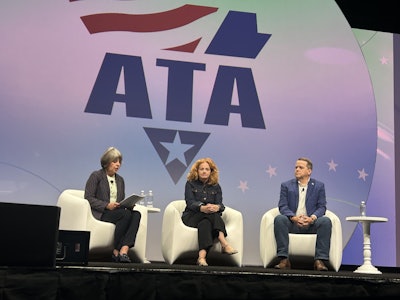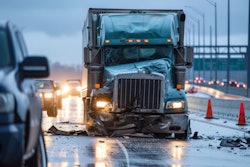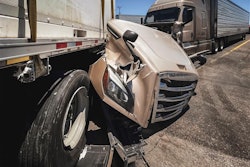
Billboard lawyers have made a career of big payday lawsuits against the trucking industry, wrecking motor carriers' operational costs, insurance coverage and long-term stability along the way.
Lawsuit abuse is a major concern of motor carriers, ranking No. 2 on the American Transportation Research Institute's (ATRI) 21st annual Top Industry Issues report. Impacted by rampant lawsuits and multi-million dollar judgements, Insurance Cost and Availability landed at No. 3.
After more than a decade of underwriting losses, premiums now reflect "the emotional and psychological biases of jurors across the country," said Pamela Blass Bracher, Deputy General Counsel, American Trucking Associations.
A panel Tuesday at the 2025 ATA Management Conference & Exhibition in San Diego offered warnings to motor carriers, as legal and executive leaders from Werner Enterprises and Wabash – companies that have each faced nine-figure jury verdicts – noted that the current legal climate allows fleets to "be right and still fail" in court, said Kristin Glazner, Wabash National's chief administrative officer.
"So often we reach the conclusion, and correctly reach the conclusion, that it's not our fault, but that isn't really the end of the analysis," Meisgeier said. "The next phase of the analysis is, 'What do we have for problem areas?' Or looking at your driver's file, checking out the equipment a little bit closer, making sure that you did follow all your policies."
Meisgeier said the Werner accident in Texas initially seemed fairly straightforward.
"We're on one side of the interstate, traveling well below the posted speed limit – 15 to 20 miles an hour below the posted speed limit – a pickup, coming the other direction on the interstate, loses control, spins through the median, comes up in front of our driver, and there's a horrible accident. Under any analysis, our driver traveling below the posted speed limit reacted well before he would be expected to react to the accident and brought his vehicle to a controlled stop in his lane of travel," he recalled. "That took me 60 seconds to describe that accident to you. That case took six weeks to try because every document at Werner was analyzed. Every person who had ever touched that driver was deposed."
"I don't care how good of a witness you are, in a six-hour deposition you are going to step on your own toes a couple of times. And if you do that with 20 or 30 witnesses within your company, you're going to have a lot of toes that got stepped on," he added. "Six weeks to try that case, and we talked about everything but the accident. The blind spot is thinking that everything's okay; thinking that you've got this figured out; thinking that you don't have exposure when we all do."
A focus of the plaintiffs' attorneys in the Werner case, he said, was the company's internal use of the terms "student" for a new qualified driver and "trainer" for their mentor.
"You think of a student and you think of someone who doesn't know what he or she is doing. You think of someone who's still learning. You think of someone who needs to be educated," he said. "That was shoved up our noses every single day."
Werner has since changed the terms to "placement driver" and "leader."
"Did that make Werner safer? Of course not," Meisgeier said, arguing that while plaintiff's attorneys claim to be safety advocates, the changes they force are often "just window dressing" with "nothing to do with safety."
Glazner's company faced a huge product liability verdict, despite the trailer in question being compliant with federal regulations at the time, and she warned that such verdicts throw cold water on ingenuity.
"Folks may be hesitant to try an innovative technology because they worry about having data," she said. "What does that mean for people being innovative towards the next safety invention?"
Pick yourself apart
Glazner and Meisgeier urged fleets to establish a proactive defense, starting with their own culture and policies. "Have a lawyer who you trust come pick you apart for a while," Meisgeier advised. "Look at your policies, look at your documents... I guarantee, regardless of how sanitized you think things are, you have problems in your documents in your building right now."
Glazner added that fleets must "really know your lawyers" and ensure they understand the company's values and strategies.
Reform
While internal audits are crucial, they both agreed that long-term solutions require legal reform. Glazner called tort reform a "journey," not "a silver bullet," emphasizing that most of the work is done at the state level.
Meisgeier described it as a "state by state grind" and issued a call to action for carriers to get engaged at the state level with state trucking associations and be more involved in local politics.
"If you're in a state where judges are elected, then get involved in those elections," he said, adding that in Texas, engagement from Werner and others led to "a shift... with way more reasonable, business-friendly" judges.
American Trucking Associations’ President and CEO Chris Spear said ATA’s state-level support in recent years has helped nearly 20 states pass legislation to reduce the financial impact on the trucking industry and that D.C. lawmakers may be position to help us push through federal reforms, "including a bill we had introduced last month that would move these frivolous state suits to a level playing field in federal court. So for the first time, ATA is putting a secondary lawsuit abuse strategy to advance federal legislation into full motion, further kicking the plaintiffs’ bar to the curb.”












